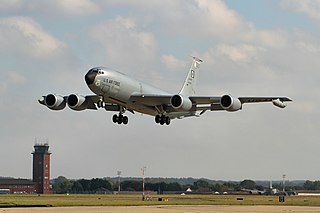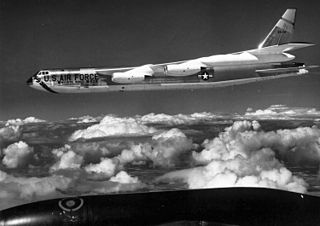Related Research Articles

Strategic Air Command (SAC) was both a United States Department of Defense (DoD) Specified Command and a United States Air Force (USAF) Major Command (MAJCOM), responsible for Cold War command and control of two of the three components of the U.S. military's strategic nuclear strike forces, the so-called "nuclear triad", with SAC having control of land-based strategic bomber aircraft and intercontinental ballistic missiles or ICBMs.

The Second Air Force is a USAF numbered air force responsible for conducting basic military and technical training for Air Force enlisted members and non-flying officers. In World War II the CONUS unit defended the Northwestern United States and Upper Great Plains regions and during the Cold War, was Strategic Air Command unit with strategic bombers and missiles. Elements of Second Air Force engaged in combat operations during the Korean War; Vietnam War, as well as Operation Desert Storm.

The Eighth Air Force is a numbered air force (NAF) of the United States Air Force's Air Force Global Strike Command (AFGSC). It is headquartered at Barksdale Air Force Base, Louisiana. The command serves as Air Forces Strategic – Global Strike, one of the air components of United States Strategic Command (USSTRATCOM). The Eighth Air Force includes the heart of America's heavy bomber force: the Northrop Grumman B-2 Spirit stealth bomber, the Rockwell B-1 Lancer supersonic bomber, and the Boeing B-52 Stratofortress heavy bomber aircraft.

Royal Air Force Mildenhall or RAF Mildenhall is a Royal Air Force (RAF) station located near Mildenhall in Suffolk, England. Despite its status as a Royal Air Force station, it primarily supports United States Air Force (USAF) operations, and is currently the home of the 100th Air Refueling Wing.

Royal Air Force Aldermaston or more simply RAF Aldermaston is a former Royal Air Force station located 8 miles (13 km) east of Newbury, Berkshire and 9.8 miles (15.8 km) southwest of Reading, Berkshire, England.

Kincheloe Air Force Base was a U.S. Air Force base during the Cold War. Built in the Upper Peninsula of Michigan in 1943 during World War II, the base was in service until 1977.

Hunter Army Airfield, located in Savannah, Georgia, United States, is a military airfield and subordinate installation to Fort Stewart located in Hinesville, Georgia.

The 2d Bomb Wing is a United States Air Force unit assigned to the Air Force Global Strike Command and the Eighth Air Force. It is stationed at Barksdale Air Force Base, Louisiana. The wing is also the host unit at Barksdale. The wing was assigned to the Air Force Global Strike Command in February 2010 as part of the reassignment of Eighth Air Force.

Royal Air Force Chelveston, or more simply RAF Chelveston, is a former Royal Air Force station located on the south side of the B645, 5 miles (8.0 km) east of Wellingborough, near the village of Chelveston in Northamptonshire, England. During the Second World War the airfield was occupied by both the Royal Air Force and the United States Army Air Forces. It was given the USAAF designation Station 105.

The 506th Air Expeditionary Group is a provisional United States Air Force unit. The group is assigned to the United States Air Forces Central 332d Air Expeditionary Wing, stationed at Joint Base Balad, Iraq.

The 22nd Operations Group is the operational flying component of the United States Air Force 22nd Air Refueling Wing. It is stationed at McConnell Air Force Base, Kansas, and is part of Air Mobility Command (AMC)'s Eighteenth Air Force.
The AN/FRC-117 Survivable Low Frequency Communications System (SLFCS) was a communications system designed to be able to operate, albeit at low data transfer rates, during and after a nuclear attack. The system used both very low frequency (VLF), and low frequency (LF) radio bands.

Matagorda Island Air Force Base is a closed military airfield on the north end of Matagorda Island, northeast of Corpus Christi, Texas. It was closed by the United States Air Force in 1975.

The 864th Bombardment Squadron is an inactive United States Air Force unit. Its last assignment was with the 494th Bombardment Wing at Sheppard Air Force Base, Texas, where it flew Boeing B-52 Stratofortresses under Strategic Air Command. It was inactivated on 2 April 1966.
Amchitka Air Force Base is an abandoned Air Force Base located on Amchitka, in the Rat Islands group of the Aleutian Islands in southwest Alaska.

The Post Attack Command and Control System (PACCS) was a network of communication sites for use before, during and after a nuclear attack on the United States. PACCS was designed to ensure that National Command Authority would retain exclusive and complete control over US nuclear weapons. Among other components, it included Strategic Air Command assets such as the Looking Glass aircraft and mission, and various hardened command and control facilities.

The 343d Bomb Squadron is a United States Air Force Reserve squadron, assigned to the 307th Operations Group. It is stationed at Barksdale Air Force Base, Louisiana.

The 668th Bomb Squadron is an inactive United States Air Force unit. It was last assigned to the 416th Operations Group at Griffiss Air Force Base, New York, where it was inactivated on 1 January 1995.

The 307th Bomb Wing is an Air Reserve Component (ARC) of the United States Air Force. It is assigned to the Tenth Air Force of Air Force Reserve Command, stationed at Barksdale Air Force Base, Louisiana. If mobilized, the wing is gained by Air Force Global Strike Command (AFGSC).

Westover Air Reserve Base is an Air Force Reserve Command (AFRC) installation located in the Massachusetts communities of Chicopee and Ludlow, near the city of Springfield, Massachusetts. Established at the outset of World War II, today Westover is the largest Air Force Reserve base in the United States, home to approximately 5,500 military and civilian personnel, and covering 2500 acres (10 km²). Until 2011, it was a backup landing site for the NASA Space Shuttle and in the past few years has expanded to include a growing civilian access airport sharing Westover's military-maintained runways. The installation was named for Major General Oscar Westover who was commanding officer of the Army Air Corps in the 1930s.
References
- ↑ Air Force Historical Research Agency IRIS Document 01047464
- ↑ Air Force Historical Research Agency IRIS Document 01041159
- ↑ Air Force Historical Research Agency IRIS Document 01033516
- ↑ Air Force Historical Research Agency IRIS Document 01031378
- ↑ Air Force Historical Research Agency IRIS Document 00456970
